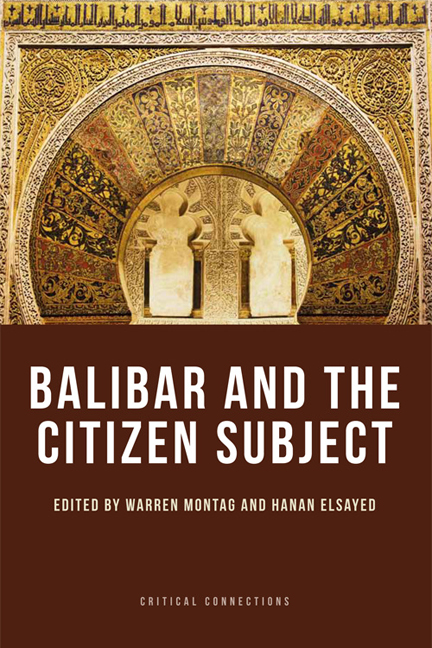Book contents
- Frontmatter
- Contents
- Introduction: Balibar and the Citizen Subject
- Part I Balibar Reading Schmitt Reading Hobbes: Equality or Similitude?
- Part II Transindividual/Universal
- 3 The “Other Scene” of Political Anthropology: Between Transindividuality and Equaliberty
- 4 Intersubjectivity or Transindividuality: The Leibniz– Spinoza Alternative
- 5 A Parallelism of Consciousness and Property: Balibar's Reading of Locke
- 6 Figures of Universalism: Notes on Philosophy and Politics in Etienne Balibar
- 7 Balibar and the Philosophy of Science: The Question of the “Epistemological Break”
- Part III Inequality, Violence and the Possibility of Citizenship
- Notes on Contributors
- Index
7 - Balibar and the Philosophy of Science: The Question of the “Epistemological Break”
from Part II - Transindividual/Universal
Published online by Cambridge University Press: 10 January 2018
- Frontmatter
- Contents
- Introduction: Balibar and the Citizen Subject
- Part I Balibar Reading Schmitt Reading Hobbes: Equality or Similitude?
- Part II Transindividual/Universal
- 3 The “Other Scene” of Political Anthropology: Between Transindividuality and Equaliberty
- 4 Intersubjectivity or Transindividuality: The Leibniz– Spinoza Alternative
- 5 A Parallelism of Consciousness and Property: Balibar's Reading of Locke
- 6 Figures of Universalism: Notes on Philosophy and Politics in Etienne Balibar
- 7 Balibar and the Philosophy of Science: The Question of the “Epistemological Break”
- Part III Inequality, Violence and the Possibility of Citizenship
- Notes on Contributors
- Index
Summary
In what follows I will discuss Etienne Balibar's return, in a series of seemingly untimely articles, to a project of which he once was a protagonist and that at the time appeared outdated. I refer to Althusserianism's epistemological project, that is, the project of developing an epistemological discourse on science, adequate to what I will call the epistemological claim of Marxism, namely the rather provocative contention that Marxism is or, better, should become what it is: the science of the theoretical object that it alone had elaborated and defined, the social and the historical, responsible for and capable of producing all the relevant objective knowledge. The circumstances could not be more unfavorable: the project in question was by then generally perceived as a “degenerating program” and was either tacitly dismissed or openly denounced. This occurred not only as an effect of the crisis of Marxism, but was also due to the spreading skepticism, connected to the rise of post-Kuhnian Science Studies, concerning the sustainability of epistemological difference in general, that is, of science's positive distinction in terms of objectivity and rationality, or of science's asymmetry regarding other kinds of “belief systems.” At that time, at the height of the Science Wars, when the only possible defense of science's objectivity against the assault of Science Studies was coming from mainstream philosophy of science (whose tenets Balibar decisively rejected), those articles risked appearing outmoded or even reactionary. Taken together, though, they constitute one of the longest, most systematic and thoroughly developed accounts of the singular epistemology involved in the work of the group around Althusser. But Balibar does not simply furnish a summary of this project; more importantly, he reflects upon it anew by returning to what is unthought in it in order to determine the extent to which it may continue to help us think about the inescapable problems that surround the notion of science.
But in what way would the epistemology in question be adequate to this bizarre claim that Marxism is the science of the social and the historical? What is the nature of this peculiar “premise,” which is stated as a thesis, aspiring to announce a fact? It is obviously a very provocative and even paradoxical thesis.
- Type
- Chapter
- Information
- Balibar and the Citizen Subject , pp. 203 - 232Publisher: Edinburgh University PressPrint publication year: 2017

